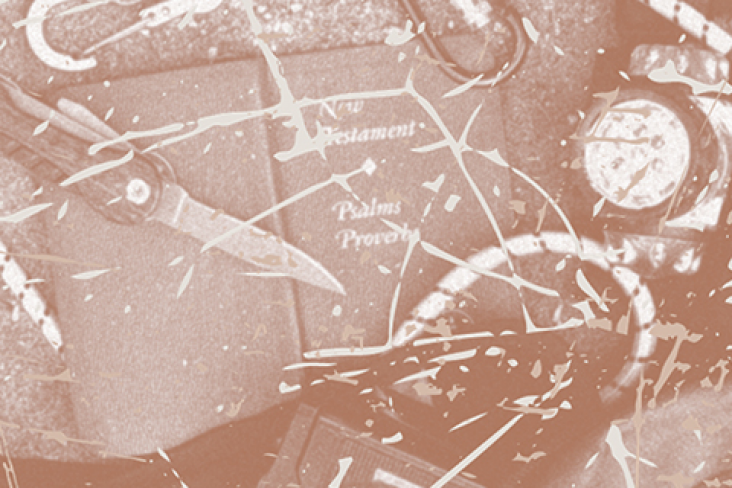Spoilers ahead! This review will discuss plot points of the show. You have been warned.
Mum’s Sugar Club is carving its theatrical path in Tāmaki Makaurau as a company spearheading tragicomedy with its startling absurdism, oft-ambitious existential themes, excellent ensembles and smart directing. Ella Meg Paulsen directs alongside writer Katie Harris for its episodic play Scale The Face, performed at Q Theatre as part of their Summer at Q festival. Staged after one and a half years of ongoing production, this instalment drops two warring brothers into survival mode and deliria when they become lost on a hike and are forced to confront their morality, free will and relationship.
A single boulder rests mid-stage, not holding much significance. The brothers and their hiking companion (Laura Dilks) emerge, inviting us to imagine slinking skinks, hot and arid weather and the outdoors. A sole set component feels suited to the expanse of imagination we are asked to employ throughout. Soon, the characters unveil the competitiveness and control the siblings strive to have over each other and to moderate their own behaviours, especially as their walk takes a desperate turn.
The boulder later becomes the symbol of a fratricide where the older brother (Hamish Boyle) uses the only set piece to lift and crush his sibling (Hunter Easterbrook) in an act of mercy. The chilling visual of brother attempting to murder brother is supported by bold lighting by Lauren Wilson and the realistic sound of a boulder crushing bones. Side lights flicker and add cold colours to the stage. Tasman Clark crafts the sound design of nature soundscapes, perfectly-timed eagle calls and the imposing voice of God.
It was effective that the setting relies upon things like handheld walls, transported tables and lighting to bring visual excitement and stimulus. Not much stays static, just as a psyche under duress wouldn’t. This propels the many tantalising ironies snaking through the play and its additional scenes, that make us question morality—like whether killing someone who is suffering may be the ultimate humane or familial act.
Props were employed in clever and funny ways, such as ‘mile-long’ exposed entrails protruding from below, boots being thrown onstage for the retelling of an injured hiker’s feet and spoons dropping right on time for prisoners to dig an escape through a wall. An impressive technical moment was the scarlet blood that spurted out of the younger brother’s mouth post-crush, which made me feel rightfully queasy and heavy.
Boyle’s performance as the murderous yet loving brother was dynamic in physicality and dedicated in emotion as he begins to question his own maturity and domineering actions. Was it his fault that this led his little brother to rebel and ingest cactus juice? Was it cruel or kind to put the boy out of his misery when he became poisoned?
However, it’s Boyle’s portrayal of a lost and simple human being talking to God that really shines. Boyle is able to increase the tension of his character’s inner turmoil regarding his brother as he confronts the omnipotence in the room. Now we get questions of free will and the purpose of God’s plan, but how grateful are we to the deus ex machina if we aren’t our own saviour?
Hunter Easterbrook itches the audience’s tear ducts with a performance of vulnerability and seamless comedy. It’s clear that his character wants to be validated and prioritised, despite feigning independence, and his youth compared to his brother is evident in his physicality. Easterbrook’s further commitment to expressing pain for a good length of the play makes sure we never forget what has unfolded in this tragic tale, which is chilling precisely because the actor has created the feeling of an authentically imperfect brotherhood.
“Despite darker themes, there are hilarious moments of slow-motion, scenes of refreshing absurdity and eccentric characters.”
After witnessing the growth of their folie à deux, writer Harris throws in the key player among it all. God emerges to speak to the surviving brother, who wants nothing to do with Him. The deity points out that He stranded the brothers in dire circumstances but gave them more time and reason to be together. Do those parameters somehow describe life to the extreme?
Despite darker themes, there are hilarious moments of slow-motion, scenes of refreshing absurdity and eccentric characters. Laura Dirks shapeshifts into multiple characters with ease and provides a mediation between the two brothers, before disappearing without a trace.
Frannie Johnson and Connor Magatogia make a funny pair of slapstick officers in one scene, then an imposing father and distressed son in the next. Director Paulsen also cleverly sits Johnson in the audience to make noise as a man faces a hanging. Magatogia’s presence as a man on death row is hilarious with his excellent facial expressions.
Nabeelah Khan dives headfirst into several roles as well, including the hangman perturbed at his prisoner escaping his death sentence thrice, and as a daughter whose familial struggles are painfully overlooked. Khan accentuates these characters in notable ways, adjusting voice and movement, and adding dimension to scenes with excellent stage presence.
The writing makes sure not to overcrowd the narrative, as does the direction of blocking—together, they hone in on the fraternal, with its secondary characters and scenes propelling the growing madness and themes of moderation that the story dares us to think about.
I’m very much looking forward to what Mum’s Sugar Club will torment (and tickle) me with next. And that will definitely be soon, with their anti-romance Love Makes the Bed it Lies next at the Factory Theatre from February 23rd.
Featured image courtesy of Mum’s Sugar Club.



